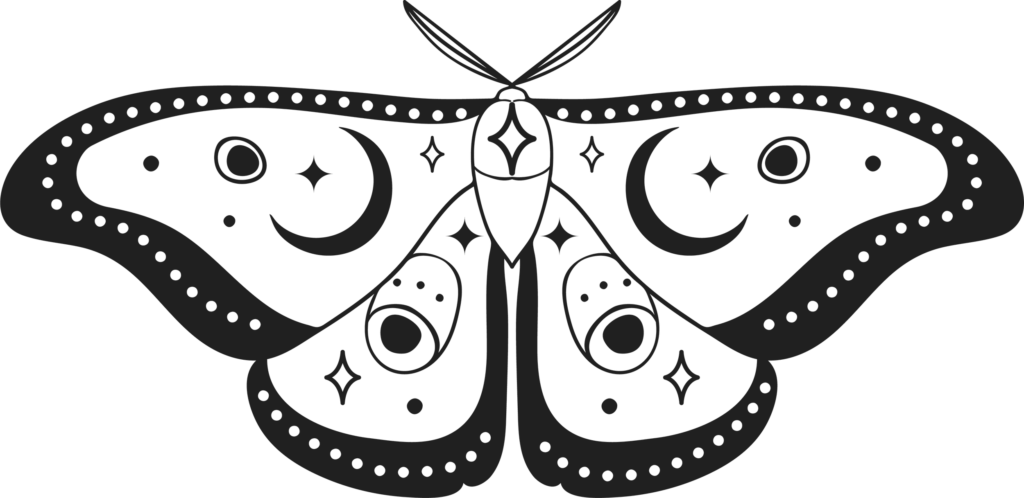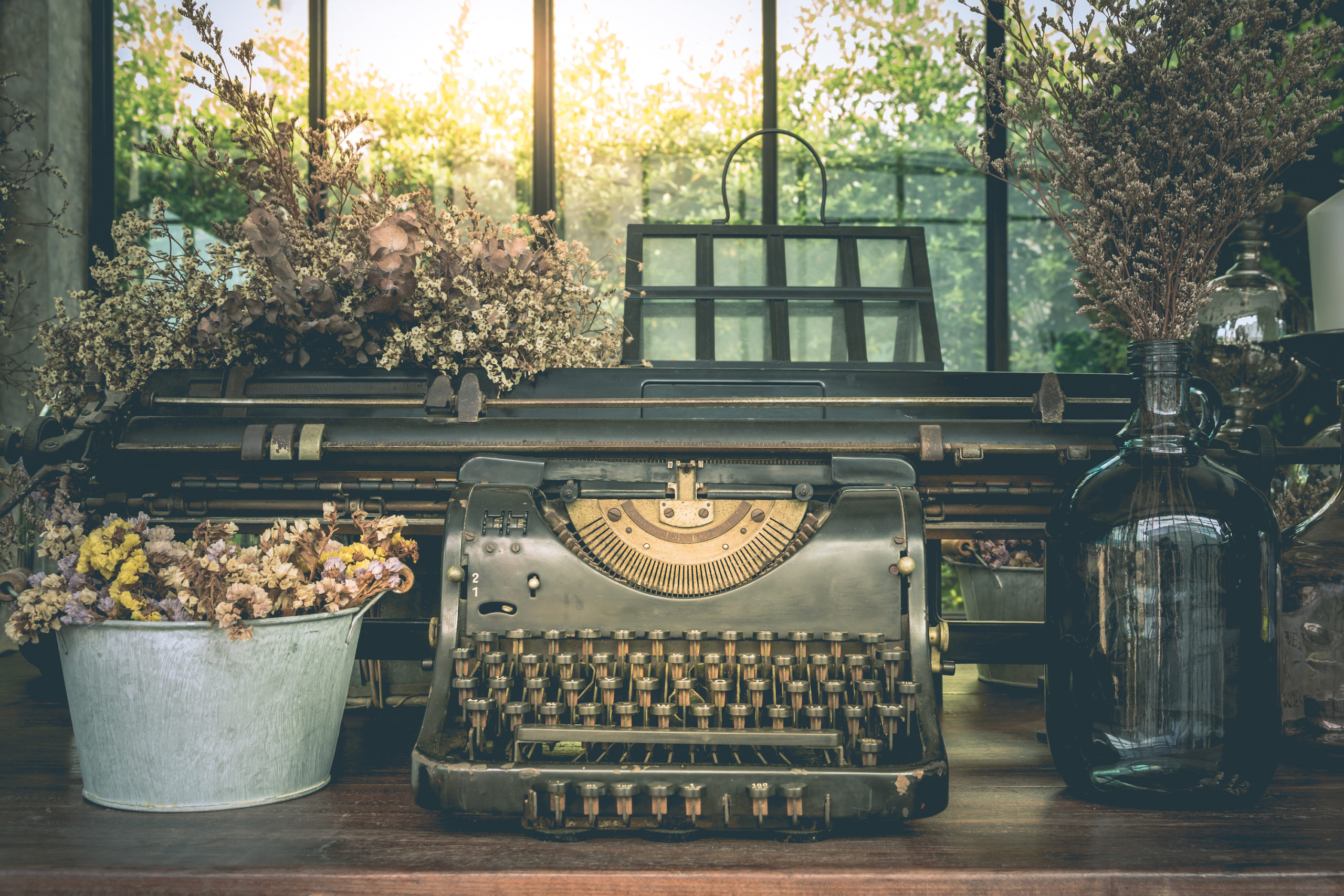My name is Cynthia, and I’m a word junkie. Word collecting is my obsession.
When I see a word I love, my heart goes aflutter. I don’t know why I have this predilection, but I have had a voracious appetite for words for as long as I can ponder.
Scrumptious, delicious words. mmmmmm
Okay, I’ll stop now. You get the point.
It’s all I can do to control myself. I don’t do a snazzy job of it most of the time.
The truth is, I have a love affair with words. The sounds of words delight me. Effervescent. Synchronicity.
Words tickle my funny bone. Jibber-jabber. Nitty-gritty.
Some of my favorite words invoke a mood. Dusk. Wonderland.
Some words are just fascinating to say. Chaos. Cacophony.
And then there are my nemesis words. Ones that I personally have a hard time pronouncing every single time. Visceral. Naked. [1]
Of course, I also use many words related to food. Ahem. And I use a lot of travel, adventure, and ocean references.
Why Word Collecting
Mostly I love words for the feelings and emotions they trigger, including the reasons above. The writer in me, though, has a special calling to notice, collect, and practice with words that will most accurately communicate the emotion or idea I’m trying to share with other human beings.
When I find a word with a subtle tweak that changes the feel of what I was communicating, the satisfaction is enchanting.
By pausing at words that catch your attention and intentionally collecting them, your vocabulary in general will expand, and your personal vocabulary will blossom.
The Problem with Word Collecting
It can backfire if we go overboard with too many of these precious words.
Our writing starts to sound like a thesaurus on steroids.
We come across as pretentious; even if we had no intention to, we could alienate others by being difficult to follow. Or exclusive.
Losing clarity for cleverness isn’t getting ourselves heard.
Word collecting isn’t about sounding more intelligent or looking more educated.
For me, it’s about fun and play and sound and meaning.
It’s about fine-tuning what I’m writing to find the nuanced word that perfectly fits what I’m trying to say and has rhythm and song to it.
As writers, we create feeling and experience, and word choice is the lifeblood of that. But we need to have a lot of words in our stash to make the most profound difference.
My Word Collecting Story
I’ve always been a word collector, but when I read Poemcrazy: Freeing Your Life with Words by Susan Goldsmith Wooldridge, a whole new world opened for me.
While I used journals to record words I had just met and needed to dictionary dive to find the definition [2], the words that oozed fun or emotion were stored in my brain’s endless list.
Wooldridge suggested writing down words just because I liked them.
What? Why hadn’t I thought of that?
But the inspiration was to write them on small cards or pieces of paper. Each word was its own being and existed separately from others so they could be more easily played with. Like writer’s paper dolls. More on this in a moment.
Teaching Word Collecting
When I was a teacher, I had students collect words. I wanted them to be logophiles. I hoped to spark an interest, if not love, for words and make them not an intangible object for “brainy” kids but something each could enjoy.
The students had to collect a few words from their reading each week and then share as many unique, original, or fun words as possible with all of us.
Some years, the entire class would floor me with their enthusiasm; some years, it would be a handful doing most of the scavenging. But it was always eye-opening, and I always learned new words.
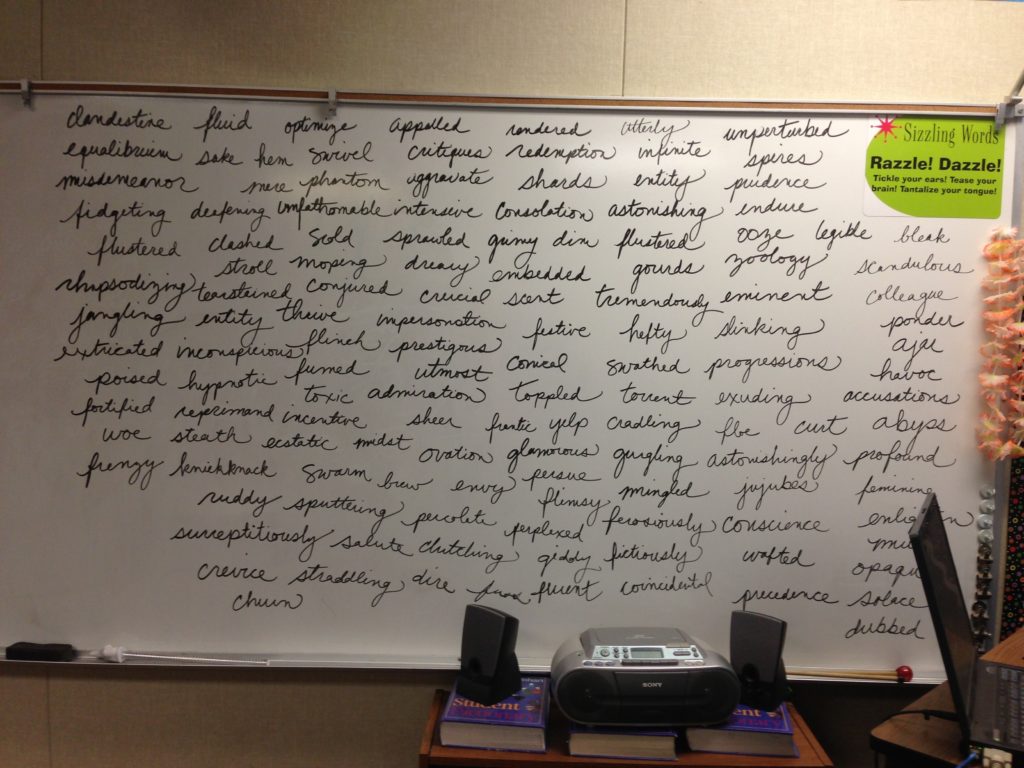
And boy, did they love finding words I didn’t know. So that was a special treat for them.
We collected words on the whiteboard. Often filling up half the board chockablock with words. We also collected words on raffle tickets, placed them in a box, and pulled them out weekly for vocabulary practice.
Students took handfuls of raffle tickets to their desks, dug through them, shared them with others, and chose the four they would use for the vocabulary lessons. All the words being talked about, shared, scattered on the floor, and rummaged through like treasures, made my heart very happy.
I still have the box.
My biggest obstacle was that they believed the words had to be long and as unusual as possible. I tried to help them fall in love with words like twilight, scuttle, and luscious. Words they could use every day.
I hope I ignited a love of word collecting in some of those wonderful kids.
Word Collecting for Writers
I think and write a lot about the importance of expressing our own uniqueness and individuality. And vocabulary is a quirky way our personality shines through the dreariness of the mundane.
Not only does it spice up our communication, fine-tune our meaning, and offer clarity, but it also expresses our one-of-a-kind voice.
By creating word banks and allowing yourself to use words that might not fit the standard of “acceptable” (only in balance with clarity, remember), you become more you.
Instead of struggling to get your thoughts across, if you have robust word banks that fit your individuality, you have a ready and easy resource when writing.
Especially verbs. And then nouns. Knowing how a character walks across the room, whether she saunters, lollygags, or swaggers, shows the reader who our character is at that moment, clear as day. Descriptive verbs are the powerhouses for writers.
The fun is playing with words you collect, and creating metaphor and extraordinary expressions. For example, connect a random noun with a random adjective with a random verb and see what happens.
Shuffle through a hodge-podge of words you’ve collected and lay them out in front of you. In what ways can you combine them? Do any make you think of other words? What feelings or emotions come up when you read them?
You can even make collections of words by moods or categories or number of syllables or a particular sound. Speaking of sound, onomatopoeia words are some of the most fun to collect.
How to Be a Word Collector
Reading and writing have expanded my vocabulary, which will probably be where you find most new words. Talking to others will also expand your vocabulary if you hang out with people who love words.
Reading words and not hearing them sometimes leads to learning the wrong pronunciation.
Oh, I’m the absolute queen of mispronunciation. Add to it, I guess I have a heavy–and unrecognizable-accent [3], and I say words wrong. A lot.
Thanks to the internet, I can now learn how to say words more correctly. Unfortunately, I have more fun learning the pronunciation from the British websites. I’m not British. I live in California. My husband is British though. Does that count?
We’ve all heard the drill: look up words you don’t know. But what does that look like? Here are some ideas to record new and unfamiliar words and words you want to hold on to.
Collection Ideas
If you’re reading on an e-book reader, you can usually click on an unfamiliar word and ta-da, instant access to the dictionary. (My goodness, technology is freaking amazing!)
I write in the margins. Not all books, but some, and if I am keeping notes in a book, I can circle or mark a new word and come back later if I can get by with context clues.
You can keep post-it notes handy for words.
Keeping a journal close at hand when reading for notetaking and word collecting is a tried-and-true habit.
Index cards, index cards cut in half, raffle tickets, and little pieces of paper can all be used if you can keep track of them.
What to Do with the Words
I have several word banks in a journal I use when writing. In addition, I’ve accumulated many pre-made lists from Pinterest and internet sources and created several of them myself. I used to create different word banks for my students and still use some of these.
Word banks can be a simple and dynamic list of words you like to use. Words for a particular writing project. I keep word banks for my author and Salted Moon writing. Want to procastinate and get off the hook for most of a day? Do a search for “other ways to say [fill in the blank].” Ways to say “awesome.” Different verbs to say “walk.” Words to describe eyes. Color words. Smell words. Emotion words. It’s absolutely endless.
While I have several of these to get my brain working when I get stuck, the ones I personally use the most are my favorite adjectives and verbs. They’re ones I put together for myself because they’re words I’d use.
If you just want to play and treasure words, putting them on strips of paper or raffle tickets and toss them in a jar or box is super fun. Putting them on index cards to use like flashcards might be more your style.
When your goal is to expand your vocabulary, it’s worth the effort to record the words in a journal. You can write down where you found the word, the dictionary definition, use it in a sentence, and maybe the etymology or roots if it helps to understand the word more deeply.
One Last Word (wink wink)
To start you on your journey–or to add to your expanding collection–I have two fun resources for you. A tantalizing list of words just because called Vivacious Vocabulary. If you grab the Feelings Word Bank, you’ll also find some robust words to enjoy.
Just use them! Express yourself with words that make you happy. Get your intentions clearly communicated by using specific and precise words. Share your feelings with nuanced words brimming with meaning.
Above all, have fun and play. Word collecting is a passionate endeavor that magically connects you with other people.
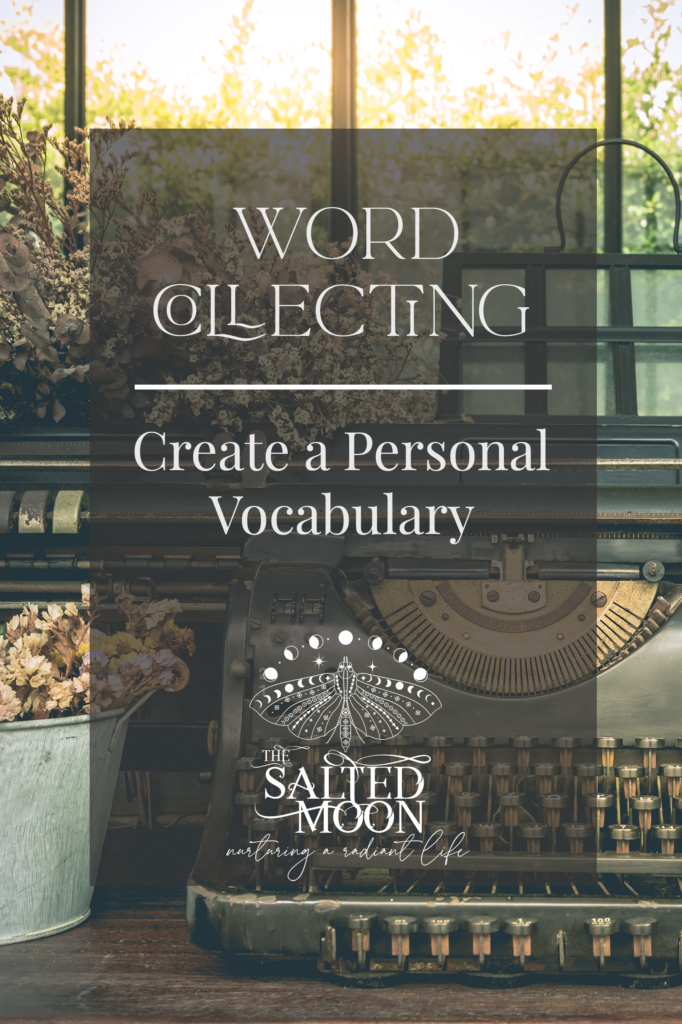
Are you a fellow word junkie? Have you used any of these ways to collect words before? Any you want to try?
[1] I’m terrible at some words in particular. Naked is one. People laugh. I don’t hear the difference. I also feel guilty because my grown daughters often say things like, “Why did we pronounce [blank] like [blank] my whole life? So embarrassing.” So, I guess I just passed the wrong pronunciation along like a prized family recipe. Maybe they’ll break the cycle.
[2] While online dictionaries are convenient, the thrill of pulling out a ten-pound book filled with teeny-tiny words upon words can’t be beaten.
[3] I think my “accent” mixes my mom’s Kansas accent and a reader’s lousy pronunciation. My British husband thinks my “California” accent is extreme. I have no idea what that means. I’m from Northern California, so it’s not a surfer or Valley Girl thing (remember that?). But he says his family and friends in England would want me to say something over and over as people here do to him. Hehehe. That just cracks me up.
